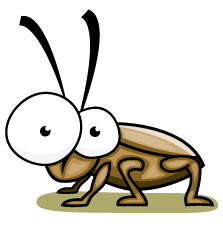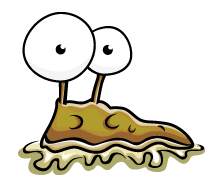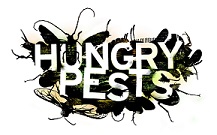Welcome to the KIDS ONLY!
Section of the Virginia Pesticide Safety Website

Insects aren’t the only pests around you. On the desk right in front of you there could be hundreds if not thousands of microscopic organisms known as bacteria and viruses which could cause sickness. The vine growing up the tree in the backyard or at the playground could be poison ivy.

- Where it doesn’t belong
- Could cause harm or injury to a person, plant or animal or
- Could cause damage to property
Undesirable pests can be managed in different ways. You will see the term integrated pest management discussed throughout the Virginia Pesticide Safety website. Integrated pest management or IPM refers the steps or practices that are taken to control or manage a pest issue. The purpose of IPM is to reduce the use of pesticides by considering all of the methods that could be used to control a pest. You can learn more about IPM by clicking here and through some of the links provided below.
In some cases, pesticides are used as part of IPM, especially if the other steps are not effective. Pesticides are substances or mixtures of substances that prevent, destroy, repel or mitigate any pest. The term applies to products such as disinfectants, insecticides, weed killers or herbicides, fungicides and several other groups of chemicals. If your family decides to use pesticides, remember to always read and follow the label.
By the way kids, just because you have your own webpage here, doesn't mean you shouldn't explore the rest of the website. The others pages on this site are not just for your parents and teachers. Hopefully, the things you learn from the resources on this page will encourage you to explore this website and learn more about pests and the best methods to manage them.
Below are links to websites which discuss IPM and the steps you can take to reduce the impact of pests in your home, yard and garden.

The Environmental Protection Agency (EPA)
HELP! It’s a Roach! -“A Roach Prevention Activity Web Site for Kids” Roaches can spread disease and This website has “Fascinating Roach Facts”, a dot-to-dot game, printable coloring sheets, word searches and other fun activities related to roaches.Interactive Mold House Tour -Learn about mold issues in your home and how they can be addressed.
Join Our Pest Patrol -A Backyard Activity Book for Kids on Integrated Pest Management
California Department of Public Health
Timothy Tickfinder: Don't Let the Ticks Bite - Learn about tick-bite prevention from these brochures, bookmarks, coloring pages and Word Searches available from the California Department of Health.Centers for Disease Control and Prevention
Dangerous Creatures-A Visit to the CDC Insectary -This CDC video was written to educate young people from ages 8 to 12 about mosquitoes used for research at the CDC insectary. The video provides an overview of the mosquito breeding program and test conducted on moquitoes in research related to insecticide resistance.Cornell University: Biological Control
Cornell University's Biological Control website provides information about natural pest enemies in North America. The games below are designed to be used in conjunction with the Elementary Guest Entomologists & Newly Trained Scientists (eGENTS) lesson plan available here.
BC-Bug-Play the role of a ladybug as it eats aphids from the plants in the garden. This game helps teach the concept of Biological Control agents to aid in managing damaging pests.
Weed-Feeders Game-Learn to use biological control agents to manage weeds in rangeland used to raise cattle.
Parasitoids Game-Play the role of a parisitic wasp as it uses its eggs to kill aphids that are attacking plants in a garden.

Fairfax County Disease Carrying Insects Program-Fight the Bite
The Disease Carrying Insects Program (DCIP) in Fairfax County has created a number of innovative resources to educate both children and adults about mosquitoes and ticks. Each of these insects are known vectors of human and animal diseases such as West Nile Virus and Lyme disease. Learn how to "Fight the Bite" and prevent the spread of these vector-borne diseases by visiting the DCIP website.
Below are some direct links to childrens' books developed by DCIP which are viewable online.Bite Buster's Bug Time Stories (pdf)
Bite Buster in Fight the Bite (pdf)
Martians Meet the Mosquitoes/Titan Takes on the Ticks (pdf)
Ricky Beats the Birthday Bites (pdf)
Sinister Secret of the Stinky Storm Drain (pdf)
Ten Tiny Mosquitoes (pdf)
The A-B-Cs of B-I-T-E-S (pdf)
What's Buggin You? Mosquitoes and Ticks (pdf)
Ledge Light Health District (New London, CT)
Lyme Disease Activity Book for Kids - Learn about Lyme disease and the vectors that spread it through this activty book which includes word searches, cross word puzzles, coloring pages and more.Leon County Mosquito Control (Florida)
Mosquito Hawk Activity Book -Activity book containing various learning activities related to mosquito biology and control.Loudoun County's Loudoun Targets Lyme (Virginia)
Kids Activity Sheet for Lyme Disease

National Pest Management Association Inc. International (NPMA)
Pestworld for Kids –Learn to identify some common insect pests, play games and get help with school projects on this website designed for kids.Pest Quest -A kids show “about bugs, rodents and more”.
Critter Crafts -Have fun crafting different "critters".
"The Pest Detectives" eBook -Join young Millie as she learns about pests with her father, a pest management professional.
"The Uninvited Houseguest" eBook-Join 9-year old Nate as he and his family discover a mouse in their house. Millie, the Pest Detective, and her pest professional father return for this second installment in the series.
National Wildlife Federation
Batty Bug Eater - A word search which looks at bugs a bat eats.
Find more games on the National Wildlife Federation's Animal and Nature Games for Kids website.
San Diego Vector Control Program (California)
SD Swat Team Kids Website
San Diego Zoo Kids Site
Arthropods-This section of the San Diego Zoo website looks at various arthropodsActivities - Kids will find find crafts and activities including Itsy, Bitsy Spider, Fuzzy Caterpillar and Tissue Butterfly crafts which aid in learning about these creatures.
Texas A & M AgriLife Extension
Mosquito Safari - Learn more about mosquitoes on this interactive website. U.S. Department of Agriculture, Animal and Plant Health Inspection Service
U.S. Department of Agriculture, Animal and Plant Health Inspection Service
Hungry Pests Kids Activities-Learn more about how to prevent the spread of invasive species. Solve puzzles, play games, color and enjoy other art related activities. The site also includes a nature walk video as well as an origami project. You can even build your own Vin Vasive mask.U.S. National Library of Medicine
ToxMystery –An interactive tour of a virtual home which looks at toxic substances, including pesticides, which can be found in and around the home.
University of Michigan
Biokids -Kids Inquiry of Diverse Species - Learn about different animal species including insects and arachnids using the Critter Catalog and Field Guides.University of Nebraska-Lincoln
Pest Private Eye –An online game to test your investigative skills while learning about pest and IPM tools.University of Rhode Island-Tick Encounter Resource Center
The Tick Encounter Resource Center website is full of information about ticks and the diseases they spread. They have developed several games to teach young people about how to identify ticks and how to protect themselves from ticks.Tick Anatomy
Name the Parts of a Tick
Billy's Maze
Word Search
Tick Danger Zones
Find the Ticks
Memory Quiz
Other Youth Resources:
KidsHealth from The Nemours Foundation
Bug Bites & Stings –Articles discussing various biting or stinging insects.
When Bugs are Buzzing –Have you been bitten by a bug? This website has articles related to specific biting insects.
Poison Ivy –An article which discusses poisonous plants such as poison ivy and the chemical that causes rashes.